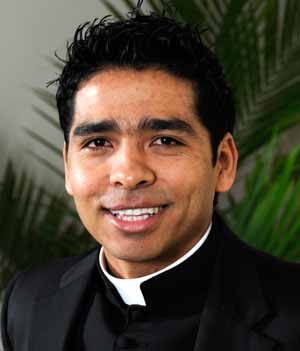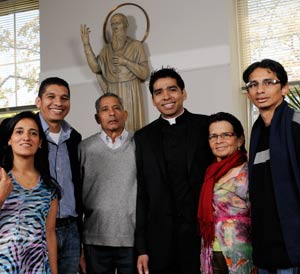 Hugo Londoño, a native of Yolombo, Colombia, will be ordained a priest of the Archdiocese of Milwaukee on Saturday, May 21 at the Cathedral of St. John the Evangelist, Milwaukee. According to Londoño, he’s found Wisconsin to be a place of cold weather, but warm hearts. View or purchase photos of the seminarians. (Catholic Herald photo by Ernie Mastroianni)This is the fifth in a series of articles introducing readers to the five men who will be ordained priests of the Archdiocese of Milwaukee on Saturday, May 21.
Hugo Londoño, a native of Yolombo, Colombia, will be ordained a priest of the Archdiocese of Milwaukee on Saturday, May 21 at the Cathedral of St. John the Evangelist, Milwaukee. According to Londoño, he’s found Wisconsin to be a place of cold weather, but warm hearts. View or purchase photos of the seminarians. (Catholic Herald photo by Ernie Mastroianni)This is the fifth in a series of articles introducing readers to the five men who will be ordained priests of the Archdiocese of Milwaukee on Saturday, May 21.
There’s a noticeable twinkle in Hugo Londoño’s eyes when he talks about his beloved hometown in Yolombo, Colombia.
Because it’s located 5,000 feet above sea level, the city enjoys an eternal springtime, according to Londoño.
“All year long it is between 73 and 80 degrees,” he said, wistfully. “It is breezy, there are flowers all year, blue skies, it’s the perfect place to be for the rest of your life.”
Yet, on Saturday, May 21, Londoño will be ordained a priest of the Archdiocese of Milwaukee, to permanently minister in a climate where spring, if it arrives, might bring snow, sleet or freezing temperatures.
Why has he left his large, close-knit family to serve God in a land so different than his home? For Londoño, the answer is easy. In Wisconsin, sure he’s found the cold temperatures, but he’s also found warm hearts.
“I have seen something in Wisconsin, even though you have the coldest weather – and the weather can be very cold – but you have the warmest hearts. Since I’ve been in this place, I’ve been received so very well by so many warm, welcoming people. It’s been a wonderful experience for me,” said the 30-year-old Colombian who spent the last four years completing his master’s of divinity degree at The Catholic University of America in Washington, D.C. “The experience in Washington, I was missing Milwaukee. People are warm. In Washington, they are more business-like, but in Milwaukee, people take more time to build relationships and come together with others.”
Londoño said he was encouraged by a friend in Washington to stay there. He responded, “Yes, Milwaukee is very cold. It’s freezing there, yes. But they got my heart.”
While Londoño admits that his adopted hometown has captured his heart, he also admitted that he was reluctant to come in the first place. The sixth of Juan de Dios Londoño and Aracelly Gallego’s nine children, he knew “since I was in my mother’s womb” that he wanted to be a priest. But he always imagined that he’d minister in his home diocese of Girardota. He entered the Pontifical Bolivarina University in Medellín at age 16 and began the nine-year seminary training process. Because he had expressed an interest in missionary work and because of his love of languages, a vocation director suggested Londoño consider becoming a religious order priest. A friend, Fr. Freddy Patino now serving in the Archdiocese of New York, suggested he investigate the Sacred Heart Fathers in Franklin.
 Hugo Londoño, center, poses with his family at Saint Francis Seminary, St. Francis, on Tuesday, May 17. His family flew from Colombia to witness his ordination. From left, they are his sister-in-law, Dora Elena Duque Tabares; his brother John Fredy Londoño Gallego; his father Juan de Dios Londoño Catano; his mother Aracelly Gallego de Londoño; and his brother Francisco Javier Londoño Gallego. Dara, John and Francisco live in Medellin and his parents live in Yolombo, the town where the family was raised. (Catholic Herald photo by Ernie Mastroianni)“At the beginning, I said, ‘No, I don’t like the United States, I haven’t studied the language, it’s too cold there.’ I was putting all the negative things out there, but after a while of deciding, the vocation director from Sacred Heart went to Colombia to visit me and my family. I was very sincere with him and thanked him, but I told him I was happy here,” he recalled. Yet, he added, “God works in mysterious ways.”
Hugo Londoño, center, poses with his family at Saint Francis Seminary, St. Francis, on Tuesday, May 17. His family flew from Colombia to witness his ordination. From left, they are his sister-in-law, Dora Elena Duque Tabares; his brother John Fredy Londoño Gallego; his father Juan de Dios Londoño Catano; his mother Aracelly Gallego de Londoño; and his brother Francisco Javier Londoño Gallego. Dara, John and Francisco live in Medellin and his parents live in Yolombo, the town where the family was raised. (Catholic Herald photo by Ernie Mastroianni)“At the beginning, I said, ‘No, I don’t like the United States, I haven’t studied the language, it’s too cold there.’ I was putting all the negative things out there, but after a while of deciding, the vocation director from Sacred Heart went to Colombia to visit me and my family. I was very sincere with him and thanked him, but I told him I was happy here,” he recalled. Yet, he added, “God works in mysterious ways.”
Sometime later, Londoño, acknowledging that Colombia enjoys a wealth of vocations to the priesthood, realized that there was a greater need for priests in the United States.
He agreed to discern a possible vocation with the Sacred Heart Fathers and arrived in Franklin in 2004. Always interested in languages – Londoño speaks Italian, French, some Portuguese, in addition to his native Spanish and has studied Latin and classical Greek – he arrived in the U.S. without knowing English.
“I came with no English. Zero. I remember panicking for the first weeks and I spent those first weeks not able to speak, making signs and acting out what I was trying to say,” he said. Feeling vulnerable, Londoño said he used the same methods to learn English that he had employed to learn the other languages, but he admitted the grammar structure was a challenge.
Little by little his English language skills developed, but while he’s become comfortable with English, he found that a vocation with a religious order was not a good fit for him. He studied at both Sacred Heart School of Theology and at the Catholic Theological Union in Chicago, yet found that not to be his call.
A seminarian he had befriended while in Wisconsin, Fr. Angel Anaya, a Colombian ordained for the Milwaukee Archdiocese in 2009, suggested he look into the diocesan priesthood.
“He said, ‘We need bilingual priests; you are already here and I can put you in contact with the vocation’s director,” said Londoño, recalling the invitation in 2007 to consider diocesan priesthood at a time when he was considering returning to Colombia.
Londoño spent the next few years as a seminarian for the Archdiocese of Milwaukee, studying in Washington, D.C., with a year in pastoral work at the Cathedral of St. John the Evangelist, Milwaukee.
Reflecting on his journey to ordination, Londoño said a vocation is not only having the willingness to follow the Lord, but the willingness to overcome challenges.
“One of the challenges for me was to leave my family. Leaving my family was a tough decision, because it’s different if I had joined a diocese in Colombia, I know I could take a car and in one hour, you are home. But I am not just leaving the state, I am leaving the country,” he said. “I put everything in God’s hands, even though I miss Spanish, to hear the salsa and merengue …. But I really believe the Scripture passage which says we’re called to leave father and mother for the sake of the kingdom. I believe I will find father, mother, family wherever I go and each time I read this passage, it gives me a chill. I truly believe when the Lord says that, when this is God’s work, everything works out.”
Five members of Londoño’s family, including his parents, arrived Monday from Colombia, for the ordination, the first priest in history for either side of his family, he noted proudly.
“It’s very exciting for a very Catholic family,” he said, noting that a great grandfather of his spent 10 years with the Jesuits, but when on a mission he “met my great grandma and here I am!”
Londoño traces the roots of his vocation to his tight-knit Catholic family.
“I saw my parents praying, I always saw them going to church, helping out. While I don’t say that we are rich, they always had the ability to help others in need and it was through that example that everything came together for me,” he said of his vocation.
He also credits his parents for giving all of their children a love of education and a strong moral grounding.
While his parents were farmers — farming sugar cane, coffee, and milking cows — they valued education for their children And their efforts paid off, as his oldest brother is a mechanical engineer, another is a hospital administrator, another a chemist and another owns a company which imports car parts.
While Londoño looks forward to serving Prince of Peace Parish, Milwaukee, as associate pastor, he remembers fondly his “first parish ever,” consisting of his younger siblings.
“My earliest memories as a child of 7 or 8, I was teaching my youngest siblings about the Bible and was celebrating Mass on my mother’s bed with chip potatoes and orange juice,” he recalled, laughing.
As a priest, Londoño said he is most looking forward to preaching, even though during his seminary training he said it was his greatest fear.
“After being a deacon, I realized I am able to speak and I enjoy preparing the readings. I love the Bible and to me (preaching) is a way to pray the word of God,” he said.
Equally at ease in urban settings such as the cathedral or Prince of Peace as well as the rural landscape of his beloved Colombia, Londoño noted that he is looking forward to ministering to all the people of the archdiocese, not only the Spanish-speaking.
“I’m not being ordained for the Hispanics; I’m being ordained for the Archdiocese of Milwaukee and my experience in seminary training, in Anglo communities means I can do that as well there as in any other parish.”
In his spare time, Londoño said he enjoys swimming, volleyball, singing and learning languages.
“I used to dance a lot. I grew up with a family of very good dancers, beginning with my grandma,” he said, quickly clarifying that dancing in Colombia is quite different than in the United States where dancing is often associated with drinking and partying. In Washington, he learned to love opera, the arts and theater.
“I have a wide range of hobbies from academics to camping and outdoor activities,” he said.
Most of all, however, he is looking forward to putting his 13 years of seminary training into practice.
“I’m not saying I have all the tools, but I’ve been exposed to ministry a lot – with children, teens, young adults, missions – and I’m looking forward to putting into service what I can do for others,” he said.
